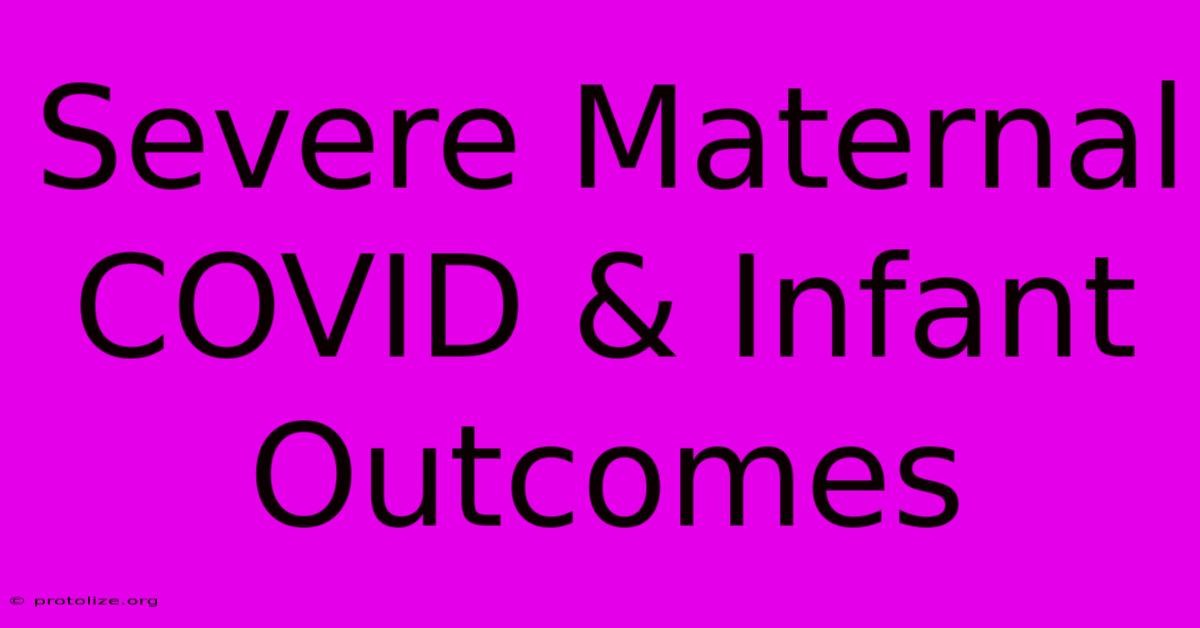Severe Maternal COVID & Infant Outcomes

Discover more detailed and exciting information on our website. Click the link below to start your adventure: Visit Best Website mr.cleine.com. Don't miss out!
Table of Contents
Severe Maternal COVID-19 & Infant Outcomes: A Concerning Trend
The COVID-19 pandemic presented unprecedented challenges to global health, and pregnant individuals were particularly vulnerable. While many pregnant women experienced mild or asymptomatic infections, a significant number developed severe COVID-19, leading to concerning outcomes for both mother and baby. This article explores the link between severe maternal COVID-19 infection and adverse infant outcomes, examining the risks, potential mechanisms, and ongoing research in this critical area.
Understanding the Risks: Severe Maternal COVID-19 and its Impact
Severe COVID-19 in pregnant women presents a multifaceted risk. The virus itself can directly impact the mother's health, leading to complications like:
- Pneumonia: Severe lung infections can compromise oxygen levels, affecting both the mother and the developing fetus.
- Acute Respiratory Distress Syndrome (ARDS): This life-threatening condition requires intensive care and can have devastating consequences.
- Sepsis: A life-threatening response to infection, sepsis can lead to organ failure and death.
- Blood Clots (Thromboembolism): COVID-19 increases the risk of blood clots, which can cause strokes, heart attacks, or pulmonary embolism.
- Pre-eclampsia/Eclampsia: These hypertensive disorders of pregnancy are exacerbated by COVID-19, potentially leading to premature delivery and other complications.
These maternal complications directly translate into increased risks for the infant.
Adverse Infant Outcomes Linked to Severe Maternal COVID-19
Studies have shown a correlation between severe maternal COVID-19 and a range of adverse infant outcomes, including:
- Preterm Birth: Severe illness in the mother often necessitates early delivery, leading to preterm birth and its associated complications. Premature babies face a higher risk of respiratory problems, developmental delays, and long-term health issues.
- Low Birth Weight: Infants born to mothers with severe COVID-19 are more likely to have low birth weight, which is associated with increased mortality and morbidity.
- Stillbirth: Sadly, some studies have reported an increased risk of stillbirth in mothers with severe COVID-19.
- Neonatal Intensive Care Unit (NICU) Admission: Infants born to mothers with severe COVID-19 are more likely to require admission to the NICU due to respiratory distress, feeding difficulties, or other complications.
- Increased Risk of Infection: Though less frequently studied, some evidence suggests a potential increased risk of postnatal infection in infants.
- Neurodevelopmental Delays: While research is ongoing, some studies hint at a possible increased risk of long-term neurodevelopmental delays in infants born to mothers who experienced severe COVID-19.
Mechanisms: How Does Severe Maternal COVID-19 Affect the Infant?
The exact mechanisms linking severe maternal COVID-19 to adverse infant outcomes are still being investigated. However, several potential pathways are being explored:
- Placental Dysfunction: The virus may directly impact the placenta, compromising nutrient and oxygen delivery to the fetus.
- Inflammation: The systemic inflammation associated with severe COVID-19 can affect fetal development.
- Premature Aging of the Placenta: Some studies suggest that COVID-19 may accelerate placental aging, leading to premature delivery and other complications.
- Direct Viral Transmission: While less common, vertical transmission (mother to baby) of the virus is possible, though the consequences of this are not fully understood.
Ongoing Research and Future Directions
Research into the long-term effects of maternal COVID-19 on infant health is crucial. Studies are ongoing to:
- Define the long-term consequences for infants exposed to severe maternal COVID-19: This includes tracking developmental milestones, cognitive function, and overall health.
- Identify risk factors: Pinpointing specific factors that increase the risk of adverse outcomes can help inform preventative strategies.
- Develop effective interventions: Researchers are exploring potential interventions to mitigate the risks associated with severe maternal COVID-19.
Conclusion: The Importance of Vaccination and Prevention
The link between severe maternal COVID-19 and adverse infant outcomes is a significant public health concern. Vaccination remains the most effective way to protect pregnant individuals from severe COVID-19. Early identification and management of COVID-19 in pregnancy are also critical. Further research is essential to fully understand the long-term impact of maternal COVID-19 and to develop strategies for preventing adverse outcomes for both mother and baby. This includes ongoing surveillance and robust data collection to track the long-term health of infants born to mothers with COVID-19. The future of maternal and infant health necessitates a concerted effort to address this emerging challenge.

Thank you for visiting our website wich cover about Severe Maternal COVID & Infant Outcomes. We hope the information provided has been useful to you. Feel free to contact us if you have any questions or need further assistance. See you next time and dont miss to bookmark.
Featured Posts
-
Microsoft 365 Copilot Gcc Now Public
Dec 13, 2024
-
Viktoria Plzen Game Motm Revealed
Dec 13, 2024
-
World Championship Gukeshs Well Deserved Win
Dec 13, 2024
-
Astro Bot 2024s Best Game
Dec 13, 2024
-
Domestic Violence Arrest James Kennedy Of Vpr
Dec 13, 2024
